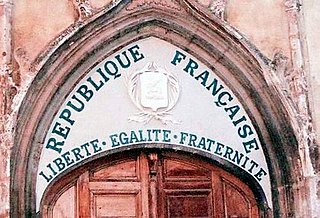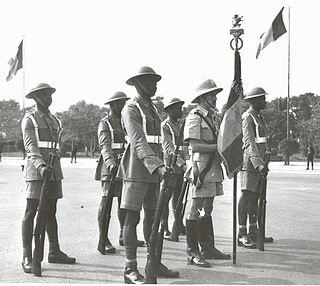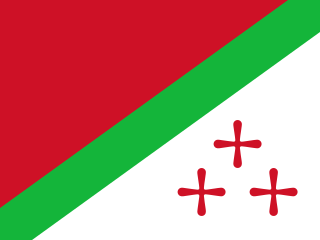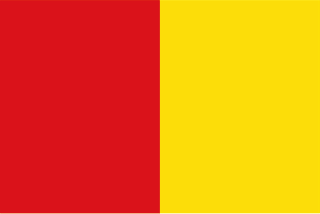
The Declaration of the Rights of Man and of the Citizen, set by France's National Constituent Assembly in 1789, is a human civil rights document from the French Revolution. Inspired by Enlightenment philosophers, the Declaration was a core statement of the values of the French Revolution and had a significant impact on the development of popular conceptions of individual liberty and democracy in Europe and worldwide.

The police are a constituted body of persons empowered by a state with the aim of enforcing the law and protecting the public order as well as the public itself. This commonly includes ensuring the safety, health, and possessions of citizens, and to prevent crime and civil disorder. Their lawful powers encompass arrest and the use of force legitimized by the state via the monopoly on violence. The term is most commonly associated with the police forces of a sovereign state that are authorized to exercise the police power of that state within a defined legal or territorial area of responsibility. Police forces are often defined as being separate from the military and other organizations involved in the defense of the state against foreign aggressors; however, gendarmerie are military units charged with civil policing. Police forces are usually public sector services, funded through taxes.

The law of war is a component of international law that regulates the conditions for initiating war and the conduct of hostilities. Laws of war define sovereignty and nationhood, states and territories, occupation, and other critical terms of law.

Authority is commonly understood as the legitimate power of a person or group over other people. In a civil state, authority is practiced by the legislative, executive, and judicial branches of government. The term authority has many nuances and distinctions within various academic fields ranging from sociology to political science.

A gendarmerie is a military force with law enforcement duties among the civilian population. The term gendarme is derived from the medieval French expression gens d'armes, which translates to "men-at-arms". In France and some Francophone nations, the gendarmerie is a branch of the armed forces that is responsible for internal security in parts of the territory, with additional duties as military police for the armed forces. It was introduced to several other Western European countries during the Napoleonic conquests. In the mid-twentieth century, a number of former French mandates and colonial possessions adopted a gendarmerie after independence.
The French Civil Service is the set of civil servants (fonctionnaires) working for the Government of France.

The Hague Conventions of 1899 and 1907 are a series of international treaties and declarations negotiated at two international peace conferences at The Hague in the Netherlands. Along with the Geneva Conventions, the Hague Conventions were among the first formal statements of the laws of war and war crimes in the body of secular international law. A third conference was planned for 1914 and later rescheduled for 1915, but it did not take place because of the start of World War I.

Laïcité is the constitutional principle of secularism in France. Article 1 of the French Constitution is commonly interpreted as the separation of civil society and religious society. It discourages religious involvement in government affairs, especially in the determination of state policies as well as the recognition of a state religion. It also forbids government involvement in religious affairs, and especially prohibits government influence in the determination of religion, such that it includes a right to the free exercise of religion.

The Declaration of the Rights of Woman and of the Female Citizen, also known as the Declaration of the Rights of Woman, was written on 14 September 1791 by French activist, feminist, and playwright Olympe de Gouges in response to the 1789 Declaration of the Rights of Man and of the Citizen. By publishing this document on 15 September, de Gouges hoped to expose the failures of the French Revolution in the recognition of gender equality. As a result of her writings, de Gouges was accused, tried and convicted of treason, resulting in her immediate execution, along with the Girondists.

The Force Publique was the military of the Congo Free State and the Belgian Congo from 1885 to 1960. It was established after Belgian Army officers travelled to the Free State to found an armed force in the colony on Leopold II of Belgium's orders. The Force Publique was heavily involved in atrocities in the Congo Free State, and also saw action in the Congo Arab war, World War I and World War II. It was renamed to the Congolese National Army in July 1960 after Congo gained independence from Belgian colonial rule.
Global citizenship is a form of transnationality, specifically the idea that one's identity transcends geography or political borders and that responsibilities or rights are derived from membership in a broader global class of "humanity". This does not mean that such a person denounces or waives their nationality or other, more local identities, but that such identities are given "second place" to their membership in a global community. Extended, the idea leads to questions about the state of global society in the age of globalization.
Humanitarian intervention is the use or threat of military force by a state across borders with the intent of ending severe and widespread human rights violations in a state which has not given permission for the use of force. Humanitarian interventions are aimed at ending human rights violations of individuals other than the citizens of the intervening state. Humanitarian interventions are only intended to prevent human rights violations in extreme circumstances. Attempts to establish institutions and political systems to achieve positive outcomes in the medium- to long-run, such as peacekeeping, peace-building and development aid, do not fall under this definition of a humanitarian intervention.

Human rights in France are contained in the preamble of the Constitution of the French Fifth Republic, founded in 1958, and the 1789 Declaration of the Rights of Man and of the Citizen. France has also ratified the 1948 Universal Declaration of Human Rights, as well as the European Convention on Human Rights 1960 and the Charter of Fundamental Rights of the European Union (2000). All these international law instruments take precedence on national legislation. However, human rights abuses take place nevertheless. The state of detention centres for unauthorized migrants who have received an order of deportation has also been criticized.

The State of Katanga, also known as the Republic of Katanga, was a breakaway state that proclaimed its independence from Congo-Léopoldville on 11 July 1960 under Moise Tshombe, leader of the local Confédération des associations tribales du Katanga (CONAKAT) political party. The new Katangese state did not enjoy full support throughout the province and was constantly plagued by ethnic strife in its northernmost region. It was dissolved in 1963 following an invasion by United Nations Operation in the Congo (ONUC) forces, and reintegrated with the rest of the country as Katanga Province.
Internal security is the act of keeping peace within the borders of a sovereign state or other self-governing territories, generally by upholding the national law and defending against internal security threats. This task and role differs from border security. Responsibility for internal security may range from police to paramilitary forces, and in exceptional circumstances, the military itself.

The principle law enforcement agency in Burundi is the National Police of Burundi. The police falls within the jurisdiction of the Ministry of Public Security. It is separate from the National Intelligence Service (SNR), the state intelligence agency.

Law enforcement in the Democratic Republic of the Congo has historically been focused on furthering the state's aims with no regard for human rights. The Police nationale congolaise is the police throughout the territory of the Democratic Republic of the Congo. It was composed of between 110,000–150,000 officers as of 2010.

An ombudsman, ombud, ombuds, bud, ombudswoman, ombudsperson, or public advocate is a government employee who investigates and tries to resolve complaints, usually through recommendations or mediation. They are usually appointed by the government or by parliament.
The dual revolution was a term first coined by Eric Hobsbawm. It refers specifically to the time period between 1789 and 1848 in which the political and ideological changes of the French Revolution fused with and reinforced the technological and economic changes of the Industrial Revolution. The French Revolution, inspired by the ideals of Enlightenment philosophy, spread ideas of democracy, nationalism, and liberalism. These political ideas were fused with the new technological advances of the industrial revolution such as the spinning jenny, steam engines, and the puddling process. With the defeat of the French Revolution and subsequently the Congress of Vienna, Metternich constructed a balance of power in Europe that would prevent one country from gaining too much power. This set the framework for a strong conservative, reactionary stance against the ideas of nationalism and liberalism spread by the dual revolution. The Holy Alliance, formed by Austria, Prussia and Russia in September 1815 became a symbol of oppression to the ideas spread by the dual revolution.

The Republic of Liège was a short-lived state centred on the town of Liège in modern-day Belgium. The republic was created in August 1789 after the Liège Revolution led to the destruction of the earlier ecclesiastical state which controlled the territory, the Prince-Bishopric of Liège. It coexisted with the even more short-lived revolutionary state, the United States of Belgium, created by the Brabant Revolution of 1789, to the north. By 1791, the forces of the republic had been defeated by Prussian and Austrian forces and the Prince-Bishopric was restored.














